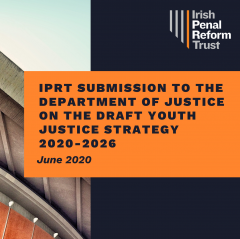IPRT Submission to the Department of Justice on the Draft Youth Justice Strategy 2020-2026
30th June 2020
 The Irish Penal Reform Trust (IPRT) has made a submission to the Department of Justice on its Draft Youth Justice Strategy 2020-2026 as part of the public consultation on the development of the strategy. We believe the Strategy presents an opportunity to create a vision and pathway for a world-leading youth justice system in Ireland.
The Irish Penal Reform Trust (IPRT) has made a submission to the Department of Justice on its Draft Youth Justice Strategy 2020-2026 as part of the public consultation on the development of the strategy. We believe the Strategy presents an opportunity to create a vision and pathway for a world-leading youth justice system in Ireland.
IPRT welcomes many aspects of the Draft Strategy, in particular: proposals to extend supports for young adults; expansion of the Bail Supervision Scheme to include children in care; and placing a positive statutory duty on State agencies to work together.
Adopting an evidence-informed approach, IPRT outlines four key areas of youth justice that should be reinforced or inserted into the Draft Strategy. These include:
- Support Transitions into Adulthood (18-24-year-olds) should be an additional ‘Priority Area’ in the Strategy. Commitments should include: extending diversion; developing age-appropriate bail schemes; and consider amending the Children Act, 2001 to allow for maturity assessments. This would permit judges to consider whether a young adult might be more appropriately dealt with in the youth justice system. This would align the Youth Justice Strategy with the remit of the Department of Children and Youth Affairs; the successor of the Better Outcomes, Brighter Futures: The National Policy Framework for Children and Young People 2014-2020; and with the upper age threshold of the Youth Work Act 2001.
- Develop innovative early release schemes, keeping in mind at all stages of the criminal justice system, that detention must be used as a last resort and for the minimum appropriate time. (Priority Area 5)
- The voices of children, young people and young adults, particularly those who have had contact with the justice system should participate and inform the future development of policies, programmes and systems. This could be achieved through the establishment of a panel of children, young people and young adults who could act as advisors to the Expert Steering Group as part of the ongoing development and implementation of the strategy.
- There should be extensive consultation with external stakeholders including civil society organisations on strengthening legislation and reviewing the Children Act, 2001. A legal framework should prohibit solitary confinement for children and govern the practice of single separation in child detention. This could be achieved through strengthening legislation by way of an amendment to the Children Act, 2001 (Priority Area 6)
As well as these four key areas, this submission outlines more detailed IPRT positions under the three ‘Thematic Objectives’ outlined in the Draft Strategy. As well as a series of recommendations on policy and comments on the Indicative Schedule of areas for amendment in the Children Act 2001, the submission points to progressive and effective models internationally, which could be adapted and implemented in an Irish context to create better outcomes for children in contact with the justice system, their families, and their communities.
Read IPRT's full submission to the Department of Justice on the Draft Youth Justice Strategy 2020-2026 here.




